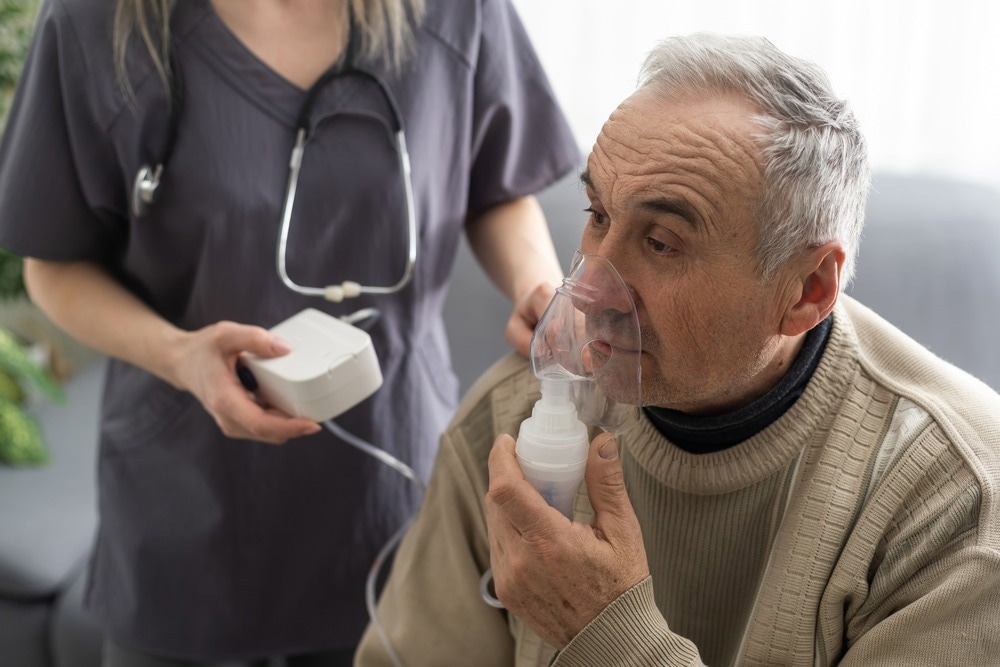Certain glucose-lowering drugs were linked to fewer moderate or severe COPD exacerbations in adults with type 2 diabetes
 Study: Glucose-Lowering Medications and Risk of Chronic Obstructive Pulmonary Disease Exacerbations in Patients With Type 2 Diabetes. Image Credit: Andrew Angelov/Shutterstock.com
Study: Glucose-Lowering Medications and Risk of Chronic Obstructive Pulmonary Disease Exacerbations in Patients With Type 2 Diabetes. Image Credit: Andrew Angelov/Shutterstock.com
A recent JAMA Internal Medicine study conducted a comparative study to understand which glucose-lowering medications were linked with the risk of moderate or severe COPD exacerbations in adults with T2D.
Background
Individuals with T2D and COPD experience higher medical expenses burden because of the greater likelihood of prolonged hospital stays and severe complications, such as respiratory failure and sepsis. Most patients diagnosed with T2D are treated with glucose-lowering medications, such as SGLT-2is, GLP-1RAs, and DPP-4is. It is important to understand how these medications affect people with COPD.
Many observational studies revealed that glucose-lowering medications improve lung functions, particularly for patients with COPD. For instance, SGLT-2is treatment led to a decrease in COPD exacerbations, DPP-4is reduced bronchial hyperresponsiveness, and GLP-1RAs improved forced vital capacity. However, these observational studies were limited by small sample size, unadjusted confounders (e.g., body mass index), and exclusion of moderate exacerbations.
Considering patients with COPD and T2D are at a higher risk of morbidity and mortality worldwide, it is important to understand the precise effects of glucose-lowering medication on this group of patients.
About the study
The US population-based cohort study, based on the target trial emulation framework, evaluated the association of SGLT-2is, GLP-1RAs, and DPP-4is with COPD exacerbation risks. All relevant data was obtained from different medical databases, including IBM Health MarketScan Research Database, Optum deidentified Clinformatics Data Mart database, and Medicare fee-for-service claims data.
A target trial was designed for pairwise comparisons of SGLT-2is vs DPP-4is, GLP-1RAs vs DPP-4is, and SGLT2is vs GLP-1RAs. Participants diagnosed with T2D and active COPD were recruited. In addition, they were required to have at least 365 days of continuous enrollment in their health care plans, with a permitted 30-day gap. Pregnant individuals, those younger than 40 years, and patients having end-stage kidney disease were excluded.
The primary outcome assessed in this study was moderate COPD exacerbation, and the secondary outcome was severe COPD. Individuals with moderate COPD were on an oral glucocorticoid prescription filled with a 5- to 14-day supply, without hospitalization and only clinic visits as outpatients. Individuals with severe COPD require more intense treatment and hospital care.
Study findings
This study included a total of 143,696 patients for SGLT-2i vs DPP-4i, 146,795 patients for GLP-1RA vs DPP-4i, and 103,356 patients for SGLT-2i vs GLP-1RA target trial emulations groups. Using 1:1 propensity score (PS) matching, based on logistic regression on 94 baseline covariates, 27,991 pairs for SGLT-2i vs DPP-4i, 32,107 pairs for GLP-1RA vs DPP-4i, and 36,218 pairs for SGLT-2i vs GLP-1RA were considered for the analysis.
Each of the three cohorts exhibited a different pattern. For example, the GLP-1RA vs DPP-4i cohort included more females than SGLT-2i vs DPP-4i cohort. Furthermore, the SGLT-2i vs GLP-1RA cohort had more patients with sleep apnea and oxygen equipment use. A higher number of obese participants were found in GLP-1RA vs DPP-4i and SGLT-2i vs GLP-1RA cohorts, compared to SGLT-2i vs DPP-4i.
Individuals treated with SGLT2is were found to be at a lower risk of moderate or severe COPD than those treated with DPP-4is. This finding was consistent across subgroup analyses as well. A greater benefit of SGLT-2is was found in obese patients with active asthma or heart failure.
A lower incidence of moderate and severe COPD exacerbation outcome was found in those treated with GLP-1RA compared with those treated with DPP-4is during median follow-up. In the SGLT-2i vs GLP-1RA group analyses, SGLT-2is treatment was found to have marginally better primary and secondary outcomes than GLP-1RAs treatment. These observations were largely consistent across all subgroup analyses.
Taken together, the current estimate revealed that patients treated with SGLT-2is were at a 19% lower risk of moderate or severe COPD exacerbations and a 29% reduction in severe exacerbations compared to those treated with DPP-4is. Furthermore, in comparison to GLP-1RAs, individuals treated with SGLT-2is were at a 6% lower risk of moderate or severe COPD exacerbations and a 7% reduction in severe exacerbations.
Conclusions
Compared to GLP-1RAs and DPP-4is, SGLT-2is treatment was found to be more efficient in lowering the risk of moderate or severe COPD exacerbations in patients with T2D. GLP-1RAs treatment also exhibited favorable results but was marginally less effective than SGLT-2is treatment. In the future, similar clinical trials must be conducted to validate the findings of the current study.